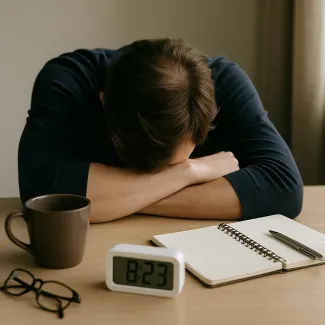
Recognizing Long-Term Fatigue: What Your Body Might Be Telling You
Understanding persistent tiredness in your 30s, 40s and 50s
Feeling constantly tired, despite getting a full night's sleep or even after taking time off to rest, is a growing concern among adults in their 30s, 40s, and 50s. This kind of fatigue often feels more than just being overworked—it’s a deep, lingering exhaustion that affects productivity, motivation, and quality of life. Unlike temporary tiredness caused by a busy week or a sleepless night, chronic fatigue tends to creep in gradually and persist, becoming the new “normal” for many.
If you’ve found yourself needing naps during the day, drinking more caffeine than ever just to function, or cancelling social plans because you lack the energy, you’re not alone. Many adults silently struggle with low energy levels, unaware that their body could be signaling something more serious beneath the surface. While some causes of fatigue are relatively benign and lifestyle-related, others could be tied to underlying health conditions that require medical attention.
This article explores the potential reasons behind persistent fatigue, how it varies through different life stages, and when it may be time to seek professional advice.
Energy struggles in your 30s: Balancing ambition and exhaustion
The 30s often bring significant lifestyle changes—career-building, parenting, financial responsibilities, and increased screen time. Amid this whirlwind of demands, it’s easy to dismiss constant tiredness as a side effect of being busy. But ongoing mental fog, lack of motivation, or waking up already feeling drained could be signs that something deeper is happening.
Hormonal fluctuations, particularly in women entering early stages of perimenopause, can influence energy levels, mood, and sleep quality. For men, gradual declines in testosterone may also affect vitality and stamina. In both sexes, thyroid disorders such as hypothyroidism often go undiagnosed during this decade, subtly impacting metabolism and energy without dramatic symptoms.
Modern lifestyle factors like nutrient deficiencies, poor sleep hygiene, and stress-related cortisol imbalances can also reduce daytime energy. Often, the fatigue isn't just physical but deeply mental, showing up as reduced concentration, irritability, or feeling emotionally flat.
If you're consistently feeling like you're "running on empty" even after a restful weekend, it's worth considering whether your fatigue is still within normal limits—or if it’s a flag that needs further investigation.
Fatigue in your 40s: Hormonal shifts and lifestyle wear
Entering your 40s often means navigating physiological transitions that intensify feelings of tiredness. For many women, perimenopause becomes more pronounced, bringing symptoms such as night sweats, insomnia, and mood swings—all of which contribute to poor rest and daytime sluggishness. Hormonal disruptions, especially with estrogen and progesterone, affect the brain’s regulation of sleep and alertness.
Men too may experience andropause, a more subtle decline in testosterone that can impact muscle recovery, mental drive, and sleep depth. Add to this the growing pressures of aging parents, teenagers, and demanding careers, and it’s not surprising that energy becomes a precious resource.
Furthermore, this is a time when undiagnosed chronic conditions such as type 2 diabetes, hypertension, or sleep apnea start to manifest. These are not always accompanied by dramatic symptoms but can severely impact day-to-day energy.
By this age, the body also becomes less efficient at absorbing certain nutrients like vitamin B12, iron, and magnesium, making nutrient depletion another common but overlooked cause of fatigue. If tiredness feels unshakable, it's important to assess whether your body is dealing with cumulative stress and age-related physiological changes that might need support.
Persistent tiredness in your 50s: Recognizing signs of deeper imbalance
Fatigue in your 50s can feel like a heavy weight that never lifts. Often mistaken for normal aging, this kind of ongoing exhaustion might actually reflect underlying medical issues, unbalanced hormones, or even emotional burnout. At this stage, sleep patterns tend to change, with many people waking more often during the night or struggling to fall back asleep. Poor sleep, especially when consistent, is one of the strongest contributors to low energy during the day.
Menopause for women and continued testosterone decline for men can impair recovery and reduce overall vitality. Additionally, chronic inflammation becomes more common in this decade, often associated with joint discomfort, gut imbalances, or autoimmune conditions—all of which are silent energy drains.
Another overlooked factor is mental fatigue, which may stem from years of high cognitive demand, caregiving fatigue, or emotional stress. Combined with physical wear and tear, this can result in a kind of whole-body fatigue that doesn’t improve with rest or time off.
Monitoring how your daily functioning is affected—whether that’s reduced stamina during walks, needing naps, or being too tired to enjoy hobbies—can be a key indicator that your fatigue is not simply a part of aging, but a message from your body that something’s off.
Common causes of chronic fatigue across all age groups
Although symptoms may vary slightly by age, several root causes appear across the board:
- Thyroid dysfunction: Hypothyroidism, Hashimoto’s
- Adrenal fatigue or cortisol dysregulation
- Vitamin and mineral deficiencies: Especially B12, iron, D3, magnesium
- Gut health issues: Dysbiosis, poor absorption, leaky gut
- Undiagnosed sleep disorders: Sleep apnea, restless legs
- Mental health: Persistent anxiety, depression, emotional overload
- Blood sugar dysregulation: Pre-diabetes, insulin resistance
- Low-grade inflammation
- Chronic infections: EBV reactivation, Lyme disease, or mold exposure
Recognizing these can be life-changing. For instance, a simple blood test can reveal a B12 deficiency, which once corrected, may restore energy significantly. Similarly, an overnight sleep study can detect apnea that, once treated, vastly improves focus, mood, and physical recovery.
When fatigue becomes a red flag
Persistent tiredness becomes concerning when it starts to impact your ability to function or enjoy life. Signs that warrant professional evaluation include:
- Fatigue lasting longer than 6 weeks
- Shortness of breath or dizziness even at rest
- Memory issues or difficulty concentrating (“brain fog”)
- Unexplained weight loss or gain
- New or worsening depression or anxiety
- Frequent infections or poor wound healing
- Palpitations, chest discomfort, or irregular heartbeat
- Any other progressive symptoms not improved with rest
Sometimes, the fatigue isn’t from one major issue, but rather a combination of smaller imbalances that create a cumulative energy drain. That’s why it’s important not to dismiss it or self-diagnose too quickly.
What to expect when you seek help
Talking to a healthcare provider about fatigue isn’t always easy, especially when blood work or standard tests come back normal. But modern integrative and functional approaches often look deeper into hormonal rhythms, nutrient absorption, inflammatory markers, and even toxic exposure. These expanded views can uncover imbalances that conventional exams miss.
Don’t hesitate to request a broader panel of blood tests, including thyroid hormones (not just TSH), cortisol levels, B12, folate, ferritin, and markers of inflammation such as CRP. Be open about lifestyle stressors, diet, sleep patterns, and even emotional health, as all these elements are interconnected.
Supporting your energy naturally
If no specific condition is found but fatigue persists, supporting your body’s natural energy systems may help restore balance. These include:
- Optimizing sleep hygiene: Avoid screens before bed, create a wind-down ritual, maintain a consistent schedule
- Prioritizing nutrient-rich meals: Especially whole foods with protein, healthy fats, and magnesium-rich greens
- Supporting the gut microbiome: Through probiotics, prebiotics, and reducing inflammatory foods
- Balancing blood sugar: Avoiding sugar crashes and supporting steady energy
- Rebuilding resilience to stress: Meditation, deep breathing, nature exposure, and proper breaks
- Moving daily, but not overtraining: Gentle movement like walking, stretching, or yoga
- Limiting stimulants: Overreliance on caffeine may mask symptoms and disrupt cortisol patterns
Most importantly, listening to your body instead of pushing through may be the most powerful health strategy you can adopt.
You don’t need to wait until exhaustion becomes unbearable. Fatigue, especially when persistent, is often your body’s first signal that something needs adjustment—whether it's your lifestyle, your biochemistry, or your emotional landscape. Paying attention early can prevent years of low-quality life and open the door to renewed energy and wellness.



